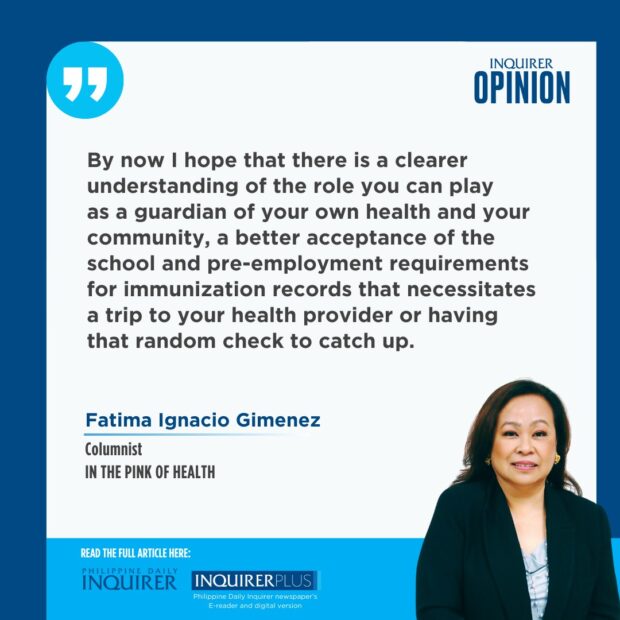
Over the weekend, a colleague posed a query if there was a shortage of hepatitis B vaccines. As of this writing, I still have to do diligent information gathering and hope that the answer would not be in the affirmative. Knowing that hepatitis B is not only a global problem, but one of the very many public health challenges that we face, her question is a cause for concern.
Writing about this brings back a decade-old memory of being toured by a good friend in a newly opened birthing facility in a public institution. Impressed, I asked whether there was a hepatitis B vaccine being given at birth as was mandated and if screening was being instituted. My informant uneasily replied that there had been a lack of supply in the months that had passed. Seeing his eyes reflect the alarm on mine, calls were made and it was fortunate to know that there were people as concerned and ready to help. It turned out that there was enough supply but maybe there had been a glitch in operations, communication, or both. In any event, those months of missed opportunities were costly.
Why so? As a briefer, hepatitis B is a virus that affects the liver and results either into an acute illness from which one may recover, meaning that you can clear it from your system, or progress into a chronic infection which increases one’s risk for cirrhosis, liver failure, and cancer. Individuals with chronic infection, more familiarly referred to as carriers, are reservoirs of infection, often are asymptomatic and unaware that they may be infected. Currently, there is no cure and vaccination remains to be the most cost-effective measure available to prevent disease.
In the Philippines, in a national survey conducted amongst adults in 2003, chronic hepatitis B was documented to be at 16.7 percent, and from a 2018 World Health Organization (WHO) Western Pacific Region report, at 10.4 percent, making the country hyperendemic for the disease. While it may be common knowledge that transmission of the virus occurs via sexual contact, percutaneous, permucosal exposure to infected blood and body fluids, and previously, to blood transfusions before required safety precautions, are you also aware that in highly endemic countries, the most common route is still perinatally, from an infected mother to her child? In a local study done in a university hospital by Carpio et al., upon chart review of 768 pregnant patients seeking prenatal care at the outpatient clinic from January to July 2014, the prevalence of hepatitis B antigen seropositivity was at 9.6 percent. This is significant on the background of an existing screening and nationwide immunization program.
In 2023, according to the WHO’s immunization dashboard for the country, coverage of the hepatitis birth dose was only at 57 percent, with only 87 percent completing the third dose, a failing grade from a targeted 95 percent. To belabor the importance of timely vaccination, let available data speak for itself. It is effective in preventing infection by 80 to 100 percent if given within 24 hours for infants born to hepatitis B positive mothers, ideally with a hepatitis immunoglobulin, and completed with the required two to three doses dependent on birth weight and if term. While antibodies may decline over time, protection is still sufficient with most not needing boosters.
Currently, to aid in the elimination of hepatitis B, aside from universal vaccination of infants at birth, routine vaccination of adolescents who were previously unvaccinated or unable to complete the series, and adults at risk, such as those on hemodialysis, immunosuppressed or with liver disease, or traveling to highly endemic areas, to name a few, are all recommended alongside screening of pregnant women. The latter is a step that is not to be missed in routine antenatal care together with testing for other sexually transmitted infections such as HIV, especially in the light of our national situation and its potential as a co-infective agent.
By now I hope that there is a clearer understanding of the role you can play as a guardian of your own health and your community, a better acceptance of the school and pre-employment requirements for immunization records that necessitates a trip to your health provider or having that random check to catch up. Looking at other road maps for other infectious and vaccine-preventable diseases, making hepatitis B history may still be possible for the incoming generation if we all act on it, help in the continuous regeneration of needed awareness, and make the call urgent.
In the earlier part of the week, when I mentioned to a good friend what I intended to write about, he momentarily paused and said, “The anticancer vaccine.” If statistics do not impress, these words should.
Be aware, be wary, and get protected.
timgim_67@yahoo.com